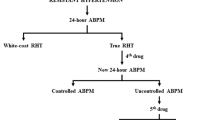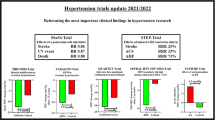Abstract
To improve the management of resistant hypertension, the French Society of Hypertension, an affiliate of the French Society of Cardiology, has published a set of eleven recommendations. The primary objective is to provide the most up-to-date information based on the strongest scientific rationale and that is easily applicable to daily clinical practice. Resistant hypertension is defined as uncontrolled blood pressure on office measurements and confirmed by out-of-office measurements despite a therapeutic strategy comprising appropriate lifestyle and dietary measures and the concurrent use of three antihypertensive agents including a thiazide diuretic, a renin-angiotensin system blocker (ARB or ACEI) and a calcium channel blocker, for at least 4 weeks, at optimal doses. Treatment compliance must be closely monitored, as must factors that are likely to affect treatment resistance (excessive dietary salt intake, alcohol, depression, drug interactions and vasopressor drugs). If the diagnosis of resistant hypertension is confirmed, the patient should be referred to a hypertension specialist to screen for potential target organ damage and secondary causes of hypertension. The recommended treatment regimen is a combination therapy comprising four treatment classes, including spironolactone (12.5–25 mg per day). In the event of a contraindication or a non-response to spironolactone, or if adverse effects occur, a β-blocker, an α-blocker, or a centrally acting antihypertensive drug should be prescribed. Because renal denervation is still undergoing assessment for the treatment of hypertension, this technique should only be prescribed by a specialist hypertension clinic.
This is a preview of subscription content, access via your institution
Access options
Subscribe to this journal
Receive 12 digital issues and online access to articles
$119.00 per year
only $9.92 per issue
Buy this article
- Purchase on Springer Link
- Instant access to full article PDF
Prices may be subject to local taxes which are calculated during checkout


Similar content being viewed by others
References
World Health Organization Global Health Risks: Mortality and Burden of Disease Attributable to Selected Major Risks. WHO: Geneva, 2009.
Aouba A, Eb M, Rey G, Pavillon G, Jougla E . Données sur la mortalité en France: principales causes de décès en 2008 et évolutions depuis 2000. Bull Epidémiol Hebd 2011; 22: 249–255.
Godet-Mardirossian H, Girerd X, Vernay M, Chamontin B, Castetbon K, de Peretti C . Patterns of hypertension management in France (ENNS 2006-2007). Eur J Prev Cardiol 2012; 19: 213–220.
Calhoun DA, Jones D, Textor S, Goff DC, Murphy TP, Toto RD et al. Resistant hypertension: diagnosis, evaluation, and treatment. A scientific statement from the American Heart Association Professional Education Committee of the Council for High Blood Pressure Research. Hypertension 2008; 51: 1403–1419.
2013 ESH/ESC Guidelines for the Management of Arterial Hypertension. The Task Force for the management of arterial hypertension of the European Society of Hypertension (ESH) and of the European Society of Cardiology (ESC). J Hypertens 2013; 31: 1281–1357.
Denolle T, Eon Y, Le Néel H, Seignard H, Battini J . District program to improve the cardiovascular risk of resistant hypertensive patients in general medicine [article in French]. Arch Mal Cœur Vaiss 2005; 98: 761–766.
Calhoun DA, Lacourciere Y, Chiang YT, Glazer RD . Triple antihypertensive therapy with amlodipine, valsartan, and hydrochlorothiazide: a randomized clinical trial. Hypertension 2009; 54: 32–39.
Oparil S, Melino M, Lee J, Fernandez V, Heyrman R . Triple therapy with olmesartan medoxomil, amlodipine besylate, and hydrochlorothiazide in adult patients with hypertension: The TRINITY multicenter, randomized, double-blind, 12-week, parallel-group study. Clin Ther 2010; 32: 1252–1269.
Hayek SS, Abdou MH, Demoss BD, Legaspi JM, Veledar E, Deka A et al. Prevalence of resistant hypertension and eligibility for catheter-based renal denervation in hypertensive outpatients. Am J Hypertens 2013; 26: 1452–1458.
Girerd X, Hanon O, Pannier B, Vaïsse B, Mourad JJ . Trends in the use of antihypertensive drugs in France from 2002 to 2012: FLAHS surveys [article in French]. Ann Cardiol Angeiol 2013; 62: 210–214.
Egan BM, Zhao Y, Li J, Brzezinski WA, Todoran TM, Brook RD et al. Prevalence of optimal treatment regimens in patients with apparent Treatment-Resistant Hypertension Based on Office Blood Pressure in a Community-Based Practice Network. Hypertension 2013; 62: 691–697.
Mulazzi I, Cambou JP, Girerd X, Nicodeme R, Chamontin B, Amar J . Six-item self-administered questionnaires in the waiting room: an aid to explain uncontrolled hypertension in high-risk patients seen in general practice. J Am Soc Hypertens 2009; 3: 221–227.
Jung O, Gechter JL, Wunder C, Paulke A, Bartel C, Geiger H et al. Resistant hypertension? Assessment of adherence by toxicological urine analysis. J Hypertens 2013; 31: 766–774.
Haute Autorité de Santé. Evaluation par classe des médicaments antihypertenseurs. Analyse médico économique. St Denis La Plaine: HAS; décembre 2012. http://www.has-sante.fr/portail/jcms/c_1554860/fr/evaluation-par-classe-des-medicaments-antihypertenseurs.
Meng L, Chen D, Yang Y, Zheng Y, Hui R . Depression increases the risk of hypertension incidence: a meta-analysis of prospective cohort studies. J Hypertens 2012; 30: 842–851.
Pedrosa RP, Drager LF, Gonzaga CC, Sousa MG, de Paula LKG, Amaro ACS et al. Obstructive sleep apnea: the most common secondary cause of hypertension associated with resistant hypertension. Hypertension 2011; 58: 811–817.
Okin PM, Devereux RB, Jern S, Kjeldsen SE, Julius S, Nieminen MS et alLIFE Study Investigators. Regression of electrocardiographic left ventricular hypertrophy during antihypertensive treatment and the prediction of major cardiovascular events. JAMA 2004; 292: 2343–2349.
Ibsen H, Olsen MH, Wachtell K, Borch-Johnsen K, Lindholm LH, Mogensen CE et al. Reduction in albuminuria translates to reduction in cardiovascular events in hypertensive patients: losartan intervention for endpoint reduction in hypertension study. Hypertension 2005; 45: 198–202.
Bobrie G, Frank M, Azizi M, Peyrard S, Boutouyrie P, Chatellier G et al. Sequential nephron blockade versus sequential renin-angiotensin system blockade in resistant hypertension: a prospective, randomized, open blinded endpoint study. J Hypertens 2012; 30: 1656–1664.
Václavík J, Sedlák R, Plachy M, Navrátil K, Plásek J, Jarkovsky J et al. Addition of spironolactone in patients with resistant arterial hypertension (ASPIRANT): a randomized, double-blind, placebo-controlled trial. Hypertension 2011; 57: 1069–1075.
Krum H, Schlaich M, Whitbourn R, Sobotka PA, Sadowski J, Bartus K et al. Catheter-based renal sympathetic denervation for resistant hypertension: a multicentre safety and proof-of-principle cohort study. Lancet 2009; 373: 1275–1281.
Esler MD, Krum H, Sobotka PA, Schlaich MP, Schmieder RE, Böhm M and Symplicity HTN-2 Investigators. Renal sympathetic denervation in patients with treatment-resistant hypertension (The Symplicity HTN-2 Trial): a randomised controlled trial. Lancet 2010; 376: 1903–1909.
Bhatt DL, Kandzari DE, O’Neill WW, D’Agostino R, Flack JM, Katzen BT et al. SYMPLICITY HTN-3 Investigators. A controlled trial of renal denervation for resistant hypertension. N Engl J Med 2014; 370: 1393–1401.
Kandzari DE, Bhatt DL, Brar S, Devireddy CM, Esler M, Fahy M et al. Predictors of blood pressure response in the SYMPLICITY HTN-3 trial. Eur Heart J 2015; 36: 219–227.
Azizi M, Sapoval M, Gosse P, Monge M, Bobrie G, Delsart P et al. Optimum and stepped care standardised antihypertensive treatment with or without renal denervation for resistant hypertension (DENERHTN): a multicentre, open-label, randomised controlled trial. Lancet 2015; 385: 1957–1965.
Schmieder RE, Redon J, Grassi G, Kjeldsen SE, Mancia G, Narkiewicz K et al. ESH position paper: renal denervation - an interventional therapy of resistant hypertension. J Hypertens 2012; 30: 837–841.
Schlaich MP, Schmieder RE, Bakris G, Blankestijn PJ, Böhm M, Campese VM et al. International expert consensus statement: Percutaneous transluminal renal denervation for the treatment of resistant hypertension. J Am Coll Cardiol 2013; 62: 2031–2045.
Pathak A, Girerd X, Azizi M, Benamer H, Halimi JM, Lantelme P et al. French Society of Hypertension; French Society of Cardiology; Working Group on Atheroma, Interventional Cardiology; French Society of Radiology. Expert consensus: renal denervation for the treatment of arterial hypertension. Arch Cardiovasc Dis 2012; 105: 386–393.
Author information
Authors and Affiliations
Corresponding author
Ethics declarations
Competing interests
The authors of these guidelines have several links of interest with manufacturers who sell health products. The authors declare that these recommendations have been developed independently of any commercial entity.
Rights and permissions
About this article
Cite this article
Denolle, T., Chamontin, B., Doll, G. et al. Management of resistant hypertension: expert consensus statement from the French Society of Hypertension, an affiliate of the French Society of Cardiology. J Hum Hypertens 30, 657–663 (2016). https://doi.org/10.1038/jhh.2015.122
Received:
Revised:
Accepted:
Published:
Issue Date:
DOI: https://doi.org/10.1038/jhh.2015.122
This article is cited by
-
Depression and anxiety in different hypertension phenotypes: a cross-sectional study
Annals of General Psychiatry (2022)
-
Evaluation of affective temperaments and arterial stiffness in different hypertension phenotypes
Hypertension Research (2021)
-
2018 Korean Society of Hypertension Guidelines for the management of hypertension: part II-diagnosis and treatment of hypertension
Clinical Hypertension (2019)
-
The Japanese Society of Hypertension Guidelines for the Management of Hypertension (JSH 2019)
Hypertension Research (2019)
-
Arterial (Aortic) Stiffness in Patients with Resistant Hypertension: from Assessment to Treatment
Current Hypertension Reports (2017)



